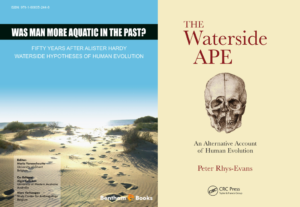Ask a room full of students and academics interested in human anatomy if they’ve ever heard of the “aquatic ape hypothesis” and most will put their hand up. Then ask them how many would regard themselves as a proponent of the idea, almost all will put their hand back down again.
Now, if you ask them if they can remember and cite a definition of what it is from the literature – it’s interesting to see what happens.
In my experience, few put their hand back up again. Most think they know what it is but their impression of it invariably comes from hearsay or maybe from a perfunctory read of an article or two or perhaps a skim through one of Elaine Morgan’s books.
It’s my contention that until recently the idea had never been adequately defined, let alone critiqued or scientifically rejected. So, when I got interested in the idea, I set about trying to define it carefully so people have a good idea what it is, and more importantly, what it is not proposing.
In the end I came up with a new label and definition for it too. They can be found in a chapter that I am proud to say I co-authored with Elaine Morgan in 2011. The label was adopted as the subtitle in the book in which it was published. More recently it was also used in the title of a BBC Radio documentary on the subject, hosted by Sir David Attenborough and a new book (“The Waterside Ape“) by Peter Rhys-Evans.

“Waterside hypotheses of human evolution
… assert that selection from wading, swimming and diving and procurement of food from aquatic habitats have significantly affected the evolution of the lineage leading to Homo sapiens as distinct from that leading to Pan.”
(Kuliukas & Morgan 2011:259.)
I think the “aquatic ape” hypothesis is a misleading label. It’s not so much that the idea is that our ancestors were “aquatic” in the sense of the word most commonly applied to aquatic mammals such as whales and dolphins and seals and dugongs or manatees, just, as Alister Hardy asked – were they more aquatic. It’s not necessarily arguing that only our ape ancestors were more aquatic, but perhaps since the split with the apes too. And there is not one single hypothesis but several, related in their general agreement that some selection from wading,. swimming and diving may have influenced our phenotype more than that of our great ape cousins.
I call these “waterside hypotheses of human evolution” and my own model, which fits under this broad umbrella term, is called “River Apes … Coastal People”.
This web site is dedicated to the model specifically in the broad context of the umbrella term.
Dr Algis Kuliukas
Perth
August 2018